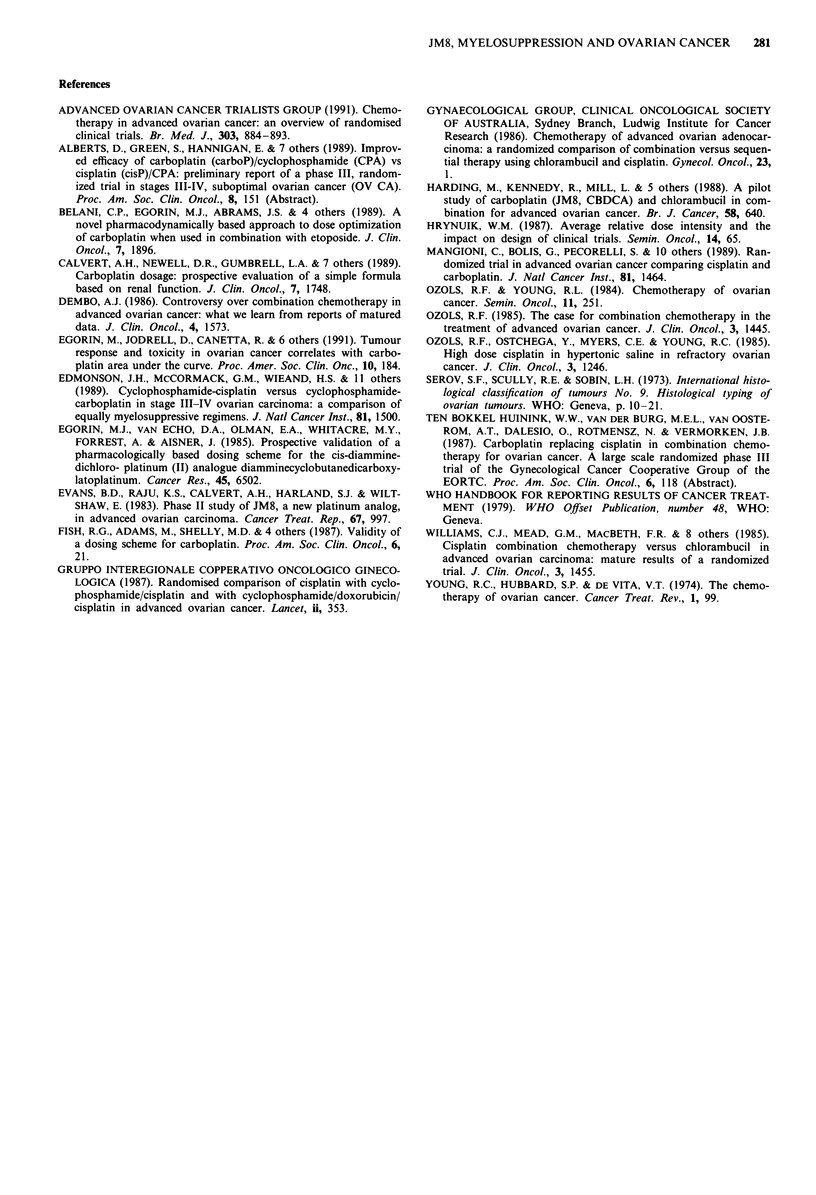Abstract
A total of 161 previously untreated patients with FIGO stage III or IV epithelial ovarian cancer were randomised after surgery to receive six courses of either carboplatin 400 mg m-2 alone (Arm A) or carboplatin 300 mg m-2 with chlorambucil 10 mg day-1 for 7 days (Arm B). The median progression free survival (PFS) was similar: arm A: 45 weeks; arm B: 61 weeks (P = 0.830). Multivariate Cox regression analysis showed that the extent of residual disease and performance status were the most important prognostic factors for PFS. Fifty-two per cent of patients received dose escalations based on nadir blood counts, and 89% of all dose adjustments were made according to protocol. Failure to achieve a significant degree of leucopenia was associated with worse progression free survival (P less than 0.001). A total of 29.4% of patients fall into this category. The median survival was similar in both arms, i.e. 75 weeks. It is unlikely that there is any major clinical advantage to adding chlorambucil to single agent carboplatin for the management of advanced ovarian cancer, but whether used in combination or a single agent, the dose of carboplatin should be sufficient to cause at least grade I leucopenia. This may best be achieved by determining the initial dose based on renal function, and then adjusting subsequent doses according to nadir blood counts.
Full text
PDF






Selected References
These references are in PubMed. This may not be the complete list of references from this article.
- Belani C. P., Egorin M. J., Abrams J. S., Hiponia D., Eisenberger M., Aisner J., Van Echo D. A. A novel pharmacodynamically based approach to dose optimization of carboplatin when used in combination with etoposide. J Clin Oncol. 1989 Dec;7(12):1896–1902. doi: 10.1200/JCO.1989.7.12.1896. [DOI] [PubMed] [Google Scholar]
- Calvert A. H., Newell D. R., Gumbrell L. A., O'Reilly S., Burnell M., Boxall F. E., Siddik Z. H., Judson I. R., Gore M. E., Wiltshaw E. Carboplatin dosage: prospective evaluation of a simple formula based on renal function. J Clin Oncol. 1989 Nov;7(11):1748–1756. doi: 10.1200/JCO.1989.7.11.1748. [DOI] [PubMed] [Google Scholar]
- Dembo A. J. Controversy over combination chemotherapy in advanced ovarian cancer: what we learn from reports of matured data. J Clin Oncol. 1986 Nov;4(11):1573–1576. doi: 10.1200/JCO.1986.4.11.1573. [DOI] [PubMed] [Google Scholar]
- Edmonson J. H., McCormack G. M., Wieand H. S., Kugler J. W., Krook J. E., Stanhope C. R., Everson L. K., Laurie J. A., Ebbert L. P., Malkasian G. D. Cyclophosphamide-cisplatin versus cyclophosphamide-carboplatin in stage III-IV ovarian carcinoma: a comparison of equally myelosuppressive regimens. J Natl Cancer Inst. 1989 Oct 4;81(19):1500–1504. doi: 10.1093/jnci/81.19.1500. [DOI] [PubMed] [Google Scholar]
- Egorin M. J., Van Echo D. A., Olman E. A., Whitacre M. Y., Forrest A., Aisner J. Prospective validation of a pharmacologically based dosing scheme for the cis-diamminedichloroplatinum(II) analogue diamminecyclobutanedicarboxylatoplatinum. Cancer Res. 1985 Dec;45(12 Pt 1):6502–6506. [PubMed] [Google Scholar]
- Evans B. D., Raju K. S., Calvert A. H., Harland S. J., Wiltshaw E. Phase II study of JM8, a new platinum analog, in advanced ovarian carcinoma. Cancer Treat Rep. 1983 Nov;67(11):997–1000. [PubMed] [Google Scholar]
- Harding M., Kennedy R., Mill L., MacLean A., Duncan I., Kennedy J., Soukop M., Kaye S. B. A pilot study of carboplatin (JM8, CBDCA) and chlorambucil in combination for advanced ovarian cancer. Br J Cancer. 1988 Nov;58(5):640–643. doi: 10.1038/bjc.1988.276. [DOI] [PMC free article] [PubMed] [Google Scholar]
- Hryniuk W. M. Average relative dose intensity and the impact on design of clinical trials. Semin Oncol. 1987 Mar;14(1):65–74. [PubMed] [Google Scholar]
- Mangioni C., Bolis G., Pecorelli S., Bragman K., Epis A., Favalli G., Gambino A., Landoni F., Presti M., Torri W. Randomized trial in advanced ovarian cancer comparing cisplatin and carboplatin. J Natl Cancer Inst. 1989 Oct 4;81(19):1464–1471. doi: 10.1093/jnci/81.19.1464. [DOI] [PubMed] [Google Scholar]
- Ozols R. F., Ostchega Y., Myers C. E., Young R. C. High-dose cisplatin in hypertonic saline in refractory ovarian cancer. J Clin Oncol. 1985 Sep;3(9):1246–1250. doi: 10.1200/JCO.1985.3.9.1246. [DOI] [PubMed] [Google Scholar]
- Ozols R. F. The case for combination chemotherapy in the treatment of advanced ovarian cancer. J Clin Oncol. 1985 Nov;3(11):1445–1447. doi: 10.1200/JCO.1985.3.11.1445. [DOI] [PubMed] [Google Scholar]
- Ozols R. F., Young R. C. Chemotherapy of ovarian cancer. Semin Oncol. 1984 Sep;11(3):251–263. [PubMed] [Google Scholar]
- Williams C. J., Mead G. M., Macbeth F. R., Thompson J., Whitehouse J. M., MacDonald H., Harvey V. J., Slevin M. L., Lister T. A., Shepherd J. H. Cisplatin combination chemotherapy versus chlorambucil in advanced ovarian carcinoma: mature results of a randomized trial. J Clin Oncol. 1985 Nov;3(11):1455–1462. doi: 10.1200/JCO.1985.3.11.1455. [DOI] [PubMed] [Google Scholar]


